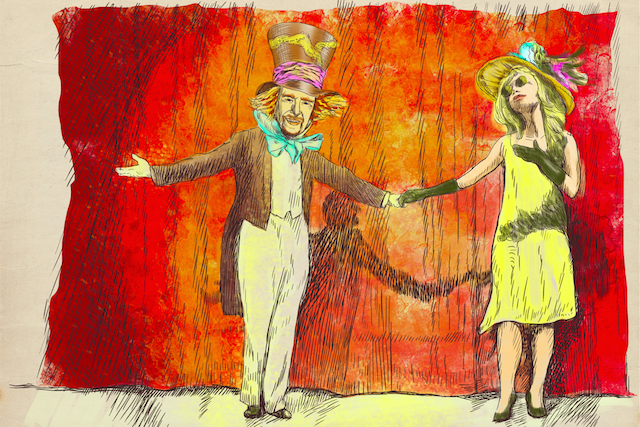
“Even when the sea is stirred up by the winds of self-doubt, we can find our way home.” ~Tara Brach
What is it about praise that’s so hard to hear sometimes?
You know the drill. You do something noteworthy, like cooking a meal for your friends or getting on stage to do a talk. Assuming things go okay, your friends or colleagues tell you a bunch of nice, encouraging things afterward:
“This meal is delicious!”
“You did great up there!”
And suddenly you feel uncomfortable.
Maybe you deflect those nice, encouraging words (“Oh, it was nothing, really”). Or worse, you graciously accept their praise, but inside you feel strangely empty, like you’re getting credit for something someone else did.
So what’s that all about? Why can’t we just let praise sink in?
To begin with, we’re often very good at dismissing people’s praise. We see all the angles, the reasons that someone’s praise doesn’t really count.
“They don’t know what they’re talking about.”
“They’re just being polite.”
Me? I often experience praise as a kind of pressure. It’s why, if I’ve made a good first impression on somebody, I want to leave the room immediately. (“Uh oh. They think I’m this charming all the time? Now I have to keep this up.”)
Through this lens, we can even turn praise into criticism:
“They think I need special encouragement.”
“Yikes. If they think that was good, they must have a really low bar for what they think I’m capable of.”
It’s like a superpower that makes you feel awful. Even when people are being nice.
This is how I imagine praise works for some people:
Do a good job -> Praise happens -> Fills up the praise vase -> They think, “I’m doing okay at this life thing!”
But this is how it often works for me:
Do a good job -> Praise happens -> I notice the glaring discrepancy between the praise and my feelings about myself -> I think, “I’ve fooled them again! I better not mess this up!”
Sound familiar?
The problem may actually be that you’re overusing your strengths. When you second-guess someone’s praise, searching for the hidden meaning of their words, you’re actually using a highly developed communication skill. You’re reading between the lines of what they’ve said. This is often a really useful skill, but if you’re like me, you may have honed that skill a little too much.
Recently a friend of mine put it this way:
“Part of the reason that I can find things hard is because I overuse my strengths. I’m really smart at looking for the nuance in things, but I look for the hidden message in *everything*. It makes my life a bit complex, and I’ve learned I need not to be so diligent at using my strengths.”
Yep yep yep.
When we second-guess every positive interaction, we turn potentially nourishing moments into a launching pad for further self-interrogation and doubt. I call this “praise-shaming”: the act of taking well-intentioned positive feedback and using it to highlight your own shortcomings.
So how do you learn to relate to praise in a more nourishing way?
First, you need to understand why praise can sometimes feel like it’s not really about you. And it’s not just an issue of self-esteem; it has to do with the nature of praise itself.
The thing about praise is that it’s a form of judgment, and it tends to be very definitive. Let’s say you’ve just done something difficult, like speaking in front of a crowd. Afterward, your friends might say…
“You were amazing!”
“Oh my god, that was so good!”
Lovely stuff, but not all that nuanced.
Our inside experience is usually so much more complicated. “I think I mostly did a good job, but also there are ten things I’d change, and I’m still not sure if that one particular person in the third row was hating every minute.”
It’s not that praise is false; it’s just too simple.
If you spend a lot of time in your own head, wondering why the world seems so simple for other people while your brain is going at a thousand miles an hour, then it’s no wonder that praise can often feel like a gross simplification of your inside experience.
The praise feels false, not because the person praising you is lying, but simply because it doesn’t match your inside reality.
And since praise is so black and white, if that praise doesn’t ring true, it kind of makes sense that our reaction to it is to go drastically the other way. We think, “Well, if it’s not actually that great, then I’m some kind of fraud, right?”
Strangely, the first step to accepting praise may actually be to take it less personally.
A funny thing started happening for me about a year ago, at the tender age of thirty-five. When someone would tell me they liked my work or they enjoyed my company, I stopped taking it so personally.
I’d think to myself, “Oh, that’s nice that they think that about this idealized version of me they have in their head. He sounds lovely.”
Doesn’t sound all that uplifting, does it? And yet, strangely, it helped me feel a lot less uncomfortable with the praise that came my way.
It took the pressure off. Suddenly there was room for that praise to be what it really is: simply an expression of how my friend is feeling in that moment when they think about me.
By not taking praise personally, I wasn’t doing any favors for my self-worth, but that was kind of the point. If every bit of well-meaning praise sparks an internal referendum on your worthiness as a human (do I really deserve this praise?), that’s not exactly a recipe for inner peace.
I couldn’t yet accept that I deserved to be praised. But by not taking praise so personally, it helped me at least accept that my friends thought I was deserving of praise (even if I privately thought they were crazy).
I tried this approach for about a year. I got better at relaxing when people would tell me nice things. I stopped worrying so much about living up to the idealized version of me that friends and colleagues had in their heads. It helped.
But there’s another step, one I’m just beginning to master. Because the truth is (as I am slowly realizing), the people in your life probably know you better than you think. In fact, your friends know you in a way you struggle to know yourself because they’re not focused on all the things you think are wrong with you.
Sure, the nice things your friends tell you might not be the whole truth, but they are still true.
Praise is what the people who care about you see when they look at you without all the layers of self-judgment.
There’s something very encouraging about this, I think. That the people around me are willing to look at me and see the good stuff, even when I’m convinced it’s not the whole story. That they are willing to focus on my strengths, not my flaws.
Through this lens, praise isn’t some kind of deception. Nor is it some kind of well-meaning misunderstanding. It’s an act of love. It’s a willingness to see the best in you, even though life is always more complicated. And these days? I’ll take that.
About Graham Panther
Graham Panther is a mental health consultant based in Melbourne, Australia. He is co-founder of the Big Feels Club, a ‘feel-osophy’ club for people who are sad or scared a bunch of the time. He believes that big, scary feelings are part of the human condition, but it helps to find other people going through that same big stuff. You can find more of Graham’s writing on the life + feelings equation at https://bigfeels.club/













 Though I run this site, it is not mine. It's ours. It's not about me. It's about us. Your stories and your wisdom are just as meaningful as mine.
Though I run this site, it is not mine. It's ours. It's not about me. It's about us. Your stories and your wisdom are just as meaningful as mine.
Enjoyed the article
As with so many things Its often easier to give then receive. We humans are odd creatures
I love this. You explained so well why we feel so uncomfortable with praise. Thank you!
Thank you for explaining this so well.
Lovely Graham, I like the twist ending.
I’ll share that idea…